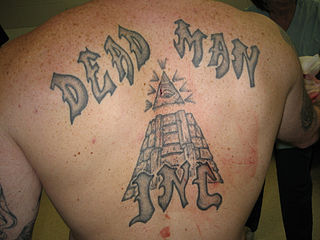Related Research Articles

Stephen Donaldson, born Robert Anthony Martin Jr. and also known by the pseudonym Donny the Punk, was an American bisexual rights activist, and political activist. He is best known for his pioneering activism in LGBT rights and prison reform, and for his writing about punk rock and subculture.
Prison sexuality consists of sexual relationships between prisoners or between a prisoner and a prison employee or other persons to whom prisoners have access. Since prisons are usually separated by sex, most sexual activity is with a same-sex partner. Exceptions to this include sex with spouses/partners during conjugal visits and sex with a prison employee of the opposite sex.
Some victims of rape or other sexual violence incidents are male. Historically, rape was thought to be, and defined as, a crime committed solely against females. This belief is still held in some parts of the world, but rape of males is now commonly criminalized and has been subject to more discussion than in the past.

California State Prison, Corcoran (COR) is a male-only state prison located in the city of Corcoran, in Kings County, California. It is also known as Corcoran State Prison, CSP-C, CSP-COR, CSP-Corcoran, and Corcoran I. The facility is just north of the newer California Substance Abuse Treatment Facility and State Prison, Corcoran.
Prison rape commonly refers to the rape of inmates in prison by other inmates or prison staff. In 2001, Human Rights Watch estimated that at least 4.3 million inmates had been raped while incarcerated in the United States. A United States Department of Justice report, Sexual Victimization in Prisons and Jails Reported by Inmates, states that "In 2011–12, an estimated 4.0% of state and federal prison inmates and 3.2% of jail inmates reported experiencing one or more incidents of sexual victimization by another inmate or facility staff in the past 12 months or since admission to the facility, if less than 12 months." However, advocates dispute the accuracy of the numbers, saying they seem to under-report the real numbers of sexual assaults in prison, especially among juveniles.

Prisoner abuse is the mistreatment of persons while they are under arrest or incarcerated. Prisoner abuse can include physical abuse, psychological abuse, sexual abuse, torture, or other acts such as refusal of essential medication, and it can be perpetuated by either fellow inmates or prison faculty.
Edna Mahan Correctional Facility for Women is a prison facility for women of the state of New Jersey Department of Corrections, located in Union Township, Hunterdon County, New Jersey, near Clinton. Its official abbreviation is EMCFW. The facility was named for Edna Mahan, one of the first female correctional superintendents in the U.S.
Rape can be categorized in different ways: for example, by reference to the situation in which it occurs, by the identity or characteristics of the victim, and by the identity or characteristics of the perpetrator. These categories are referred to as types of rape. The types described below are not mutually exclusive: a given rape can fit into multiple categories, by for example being both a prison rape and a gang rape, or both a custodial rape and the rape of a child.
Rape by gender classifies types of rape by the sex and gender of both the rapist and the victim. This scope includes both rape and sexual assault more generally. Most research indicates that rape affects women disproportionately, with the majority of people convicted being men; however, since the broadening of the definition of rape in 2012 by the FBI, more attention is being given to male rape, including females raping males.
Mountain Institution is a medium security federal penitentiary operated by the Correctional Service of Canada (CSC). It is located in the town of Agassiz, District of Kent, British Columbia, approximately 115 kilometres east of Vancouver, British Columbia.

Situational sexual behavior is a type of sexual behavior that differs from behavior that the person normally exhibits, due to a social environment that in some way permits, encourages, or compels the behavior in question. This can include situations where a person's preferred sexual behavior may not be possible, so rather than refraining from sexual activity completely, they may engage in substitute sexual behaviors.
No Escape: Male Rape in U.S. Prisons is the title of an influential, book-length 2001 report by Human Rights Watch on prison rape in the United States. The report is credited with playing a major role in the 2003 passage of the Prison Rape Elimination Act.

A prison, also known as a jail, gaol, penitentiary, detention center, correction center, correctional facility, remand center, hoosegow, and slammer, is a facility where people are imprisoned against their will under the authority of the state, generally as punishment for various crimes. Authorities most commonly use prisons within a criminal-justice system: people charged with crimes may be imprisoned until their trial; those who have pled or been found guilty of crimes at trial may be sentenced to a specified period of imprisonment.

Lesbian, gay, bisexual, transgender and queer (LGBTQ) people face difficulties in prison such as increased vulnerability to sexual assault, other kinds of violence, and trouble accessing necessary medical care. While much of the available data on LGBTQ inmates comes from the United States, Amnesty International maintains records of known incidents internationally in which LGBTQ prisoners and those perceived to be lesbian, gay, bisexual or transgender have suffered torture, ill-treatment and violence at the hands of fellow inmates as well as prison officials.
Prison rape or jail rape is sexual assault of people while they are incarcerated. The phrase is commonly used to describe rape of inmates by other inmates, or to describe rape of inmates by staff. It is a significant, if controversial, part of what is studied under the wider concept of prison sexuality.

The Alabama Department of Corrections (ADOC) is the agency responsible for incarceration of convicted felons in the state of Alabama in the United States. It is headquartered in the Alabama Criminal Justice Center in Montgomery.

The rate of sexual violence in South Africa is among the highest recorded in the world. Police statistics of reported rapes as a per capita figure has been dropping in recent years, although the reasons for the drop has not been analysed and it is not known how many rapes go unreported. More women are attacked than men, and children have also been targeted, partly owing to a myth that having sex with a virgin will cure a man of HIV/AIDS. Rape victims are at high risk of contracting HIV/AIDS owing to the high prevalence of the disease in South Africa. "Corrective rape" is also perpetrated against LGBT men and women.

Prison tattooing is the practice of creating and displaying tattoos in a prison environment. Present-day American and Russian prisoners may convey gang membership, code, or hidden meanings for origin or criminal deeds. Lack of proper equipment and sterile environments lead to health risks such as infection or disease from contaminated needles.

Approximately 741,000 women are incarcerated in correctional facilities, a 17% increase since 2010 and the female prison population has been increasing across all continents. The list of countries by incarceration rate includes a main table with a column for the historical and current percentage of prisoners who are female.

Prison violence is a daily occurrence due to the diversity of inmates with varied criminal backgrounds and power dynamics at play in penitentiaries. The three different types of attacks are inmate on inmate, inmate on guard, and self-inflicted. These attacks can either be impulsive and spontaneous or well-planned out and premeditated. Factors such as gang rivalries, overcrowding, minor disputes, and prison design contribute to violent attacks. Prisons try to avoid and deal with such situations by being proactive. Steps that are taken include placing violent convicts and gang leaders into solitary confinement, balancing the cells by critically examining each inmate to see where they are likely to reside peacefully, reducing blind spots, and conducting officer training and education.
References
- ↑ Burgason, K. A. (2017). Prison Inmate Economy. In Routledge Handbook of Corrections in the United States (pp. 409-419). Routledge.
- ↑ Stemple, L. (2008). Male rape and human rights. Hastings LJ, 60, 605.
- ↑ Trammell, R. (2011). Symbolic Violence and Prison Wives: Gender Roles and Protective Pairing in Men’s Prisons. The Prison Journal, 91(3), 305–324. https://doi.org/10.1177/0032885511409891
- ↑ Donaldson, S. (2001). A million jockers, punks, and queens. Prison masculinities, 118-126.
- ↑ Donaldson, S. (2003). Hooking up: Protective pairing for punks. na.